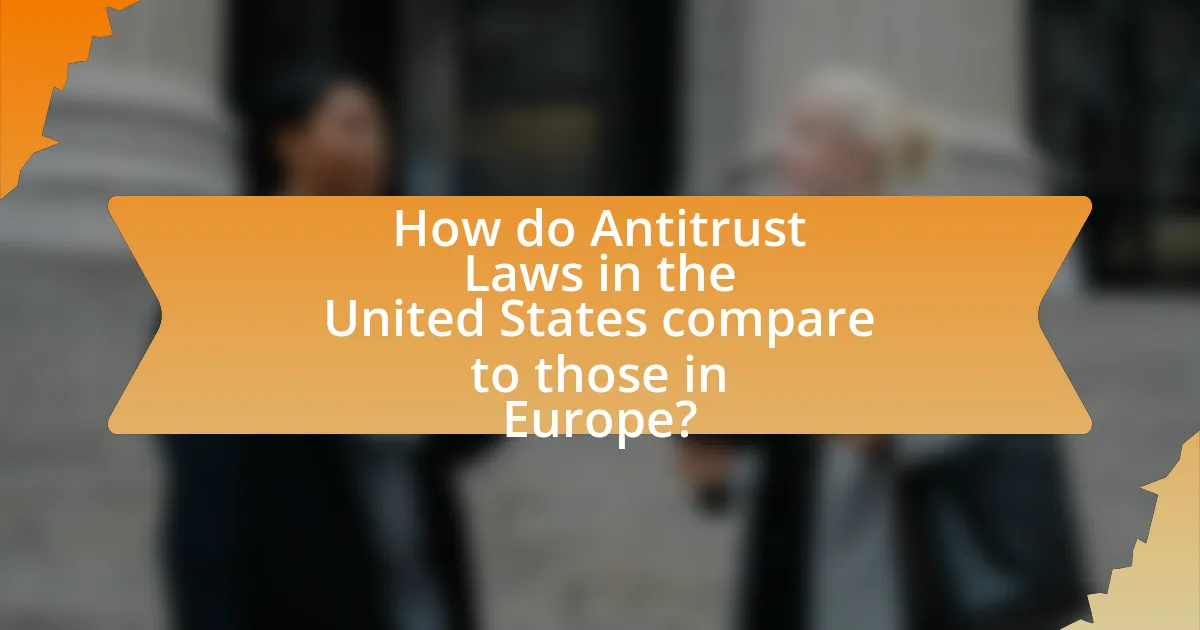The article provides a comparative analysis of antitrust laws across different countries, focusing on their definitions, importance, and variations in enforcement. It outlines the key principles underlying these laws, such as promoting competition and protecting consumer welfare, while highlighting how cultural and economic factors influence their application. The article also examines the differences between U.S. and European antitrust frameworks, the challenges posed by digital markets, and emerging trends in global antitrust regulations. Additionally, it discusses the implications for businesses operating internationally and offers practical compliance steps to adhere to antitrust laws.

What are Antitrust Laws and Why are They Important?
Antitrust laws are regulations designed to promote competition and prevent monopolistic practices in the marketplace. These laws are important because they protect consumers from unfair business practices, ensure a level playing field for businesses, and foster innovation by encouraging competition. For instance, the Sherman Act of 1890 in the United States prohibits monopolies and attempts to restrain trade, which has led to significant legal actions against companies like Microsoft and Google for anti-competitive behavior. By enforcing these laws, governments aim to maintain market integrity and consumer welfare, ultimately contributing to a healthier economy.
How do Antitrust Laws vary across different countries?
Antitrust laws vary significantly across different countries in terms of their scope, enforcement mechanisms, and underlying philosophies. For instance, the United States employs a more aggressive approach, focusing on consumer welfare and market competition, as evidenced by the Sherman Act of 1890, which prohibits monopolistic practices. In contrast, the European Union emphasizes broader social and economic objectives, as reflected in its competition policy, which includes regulations like the Treaty on the Functioning of the European Union that aim to prevent anti-competitive practices while also considering market integration and consumer protection. Additionally, countries like China have developed their antitrust frameworks more recently, with the Anti-Monopoly Law of 2008, which reflects a blend of economic growth objectives and market regulation. These differences illustrate how cultural, economic, and political factors shape the enforcement and interpretation of antitrust laws globally.
What are the key principles underlying Antitrust Laws globally?
The key principles underlying Antitrust Laws globally include the promotion of competition, prevention of monopolistic practices, and protection of consumer welfare. These principles aim to ensure a fair marketplace by prohibiting anti-competitive agreements, abuse of dominant market positions, and mergers that significantly reduce competition. For instance, the United States’ Sherman Act of 1890 established foundational antitrust principles by outlawing monopolies and conspiracies to restrain trade, while the European Union’s competition law emphasizes maintaining market competition and consumer choice. These laws are enforced by regulatory bodies, such as the Federal Trade Commission in the U.S. and the European Commission in the EU, which investigate and penalize violations to uphold market integrity.
How do cultural and economic factors influence Antitrust Laws?
Cultural and economic factors significantly influence antitrust laws by shaping the priorities and enforcement mechanisms of regulatory bodies. For instance, in collectivist cultures, such as Japan, antitrust laws may prioritize market stability and relationships over strict competition, leading to more lenient enforcement compared to individualistic cultures like the United States, where aggressive competition is often encouraged. Economically, countries with strong market economies, such as Germany, tend to have robust antitrust frameworks that focus on preventing monopolistic practices to promote consumer welfare, while developing economies may adopt less stringent laws due to the need for economic growth and market development. Historical context, such as the post-World War II economic landscape, also plays a role; for example, the U.S. implemented strict antitrust measures to dismantle monopolies, reflecting a cultural commitment to free enterprise and competition.
What are the main objectives of Antitrust Laws?
The main objectives of Antitrust Laws are to promote competition, prevent monopolies, and protect consumers from anti-competitive practices. These laws aim to ensure a fair marketplace by prohibiting practices such as price-fixing, market allocation, and monopolistic behaviors that can harm consumer welfare and stifle innovation. For instance, the Sherman Act of 1890 in the United States established foundational principles against monopolistic practices, demonstrating the historical commitment to maintaining competitive markets.
How do Antitrust Laws promote competition?
Antitrust laws promote competition by prohibiting anti-competitive practices such as monopolies, price-fixing, and collusion among businesses. These laws ensure a level playing field, allowing new and smaller companies to enter the market and compete effectively. For example, the Sherman Act of 1890 in the United States established a legal framework to combat monopolistic behaviors, leading to increased market entry and innovation. Studies show that countries with robust antitrust enforcement, like Germany and the U.S., experience higher levels of competition and consumer choice, demonstrating the effectiveness of these laws in fostering a competitive marketplace.
What role do Antitrust Laws play in consumer protection?
Antitrust laws play a crucial role in consumer protection by promoting competition and preventing monopolistic practices. These laws ensure that no single entity can dominate a market, which helps maintain fair prices and quality of goods and services for consumers. For instance, the Sherman Act in the United States prohibits monopolistic behavior and promotes market competition, which directly benefits consumers by providing them with more choices and better prices. Additionally, the European Union’s competition laws enforce similar principles, ensuring that companies do not engage in anti-competitive practices that could harm consumers. By regulating mergers and acquisitions, antitrust laws prevent the formation of monopolies that could lead to higher prices and reduced innovation, thereby safeguarding consumer interests.

How do Antitrust Laws in the United States compare to those in Europe?
Antitrust laws in the United States primarily focus on promoting competition and preventing monopolistic practices through statutes like the Sherman Act and the Clayton Act, while European antitrust laws, governed by the Treaty on the Functioning of the European Union and enforced by the European Commission, emphasize consumer welfare and market integration. In the U.S., the enforcement is often more lenient towards mergers and acquisitions, allowing for greater corporate consolidation, whereas Europe tends to scrutinize mergers more rigorously to prevent market dominance. For instance, in 2020, the European Commission blocked the merger between Siemens and Alstom, citing concerns over reduced competition, while similar mergers in the U.S. have been approved under less stringent conditions. This difference reflects a broader regulatory approach in Europe that prioritizes maintaining competitive markets over allowing market forces to dictate outcomes.
What are the major differences in enforcement between the US and EU?
The major differences in enforcement between the US and EU lie in their approaches to antitrust regulation, with the US focusing on consumer welfare and economic efficiency, while the EU emphasizes market fairness and competition preservation. In the US, the enforcement is primarily conducted by the Federal Trade Commission (FTC) and the Department of Justice (DOJ), which assess mergers and practices based on their impact on consumer prices and innovation. Conversely, the EU’s enforcement is led by the European Commission, which prioritizes maintaining competitive markets and preventing monopolistic behaviors, often imposing stricter penalties for anti-competitive practices. For instance, the EU has levied fines exceeding €10 billion on major tech companies for antitrust violations, reflecting its rigorous stance on market competition.
How does the approach to monopolies differ in the US and EU?
The approach to monopolies in the US focuses primarily on consumer welfare and economic efficiency, while the EU emphasizes market fairness and competition preservation. In the US, antitrust laws, such as the Sherman Act, prioritize preventing practices that harm consumer interests, often allowing monopolies if they can demonstrate efficiency benefits. Conversely, the EU’s competition law, particularly under Article 102 of the Treaty on the Functioning of the European Union, prohibits abusive practices by dominant firms regardless of consumer impact, aiming to maintain competitive market structures. This fundamental difference reflects the US’s more lenient stance towards monopolies that can enhance efficiency, while the EU adopts a stricter approach to ensure market integrity and prevent dominance that could stifle competition.
What are the implications of these differences for businesses operating internationally?
Differences in antitrust laws across countries significantly impact businesses operating internationally by creating varying compliance requirements and legal risks. Companies must navigate diverse regulations, which can lead to increased operational costs and complexity in their business strategies. For instance, a firm that is compliant with U.S. antitrust laws may face challenges in the European Union, where regulations are stricter regarding market dominance and mergers. This discrepancy can result in delays in market entry, potential fines, or even the prohibition of certain business practices. Additionally, businesses may need to invest in legal expertise to ensure adherence to local laws, which can strain resources and affect competitiveness.
What lessons can be learned from the US and EU Antitrust frameworks?
The primary lesson from the US and EU antitrust frameworks is the importance of balancing market competition with consumer protection. The US framework emphasizes a consumer welfare standard, focusing on price effects and market efficiency, as seen in cases like United States v. Microsoft Corp., where the court prioritized consumer choice and innovation. In contrast, the EU framework adopts a broader approach, considering factors such as market dominance and potential harm to competition, exemplified by the European Commission’s actions against Google for anti-competitive practices. This divergence highlights the need for jurisdictions to tailor their antitrust policies to their economic contexts while ensuring that both competition and consumer interests are safeguarded.
How can these lessons inform the development of Antitrust Laws in other regions?
Lessons from existing antitrust laws can guide the development of similar regulations in other regions by highlighting effective enforcement mechanisms and the importance of adapting to local market conditions. For instance, the European Union’s rigorous approach to regulating monopolistic practices has resulted in significant fines for companies like Google, demonstrating the effectiveness of stringent penalties in deterring anti-competitive behavior. Additionally, the U.S. antitrust framework emphasizes consumer welfare, which can inform other regions to prioritize consumer interests while crafting their laws. By analyzing these successful strategies and outcomes, regions can tailor their antitrust laws to better address specific economic contexts and challenges, ultimately fostering fair competition and innovation.
What best practices can be adopted from these frameworks?
Best practices that can be adopted from antitrust law frameworks in different countries include the implementation of clear guidelines for market competition, the establishment of robust enforcement mechanisms, and the promotion of transparency in merger reviews. Clear guidelines, such as those found in the European Union’s antitrust regulations, help businesses understand compliance requirements, reducing the risk of anti-competitive behavior. Robust enforcement mechanisms, as seen in the United States with the Federal Trade Commission, ensure that violations are effectively prosecuted, deterring potential offenders. Transparency in merger reviews, exemplified by the UK’s Competition and Markets Authority, fosters trust and allows stakeholders to understand the implications of corporate consolidations. These practices collectively enhance market fairness and consumer protection across jurisdictions.

What are the emerging trends in Antitrust Laws globally?
Emerging trends in antitrust laws globally include increased scrutiny of digital markets, a focus on consumer welfare beyond price effects, and the rise of international cooperation among regulatory bodies. Regulatory authorities, such as the European Commission and the U.S. Federal Trade Commission, are actively addressing anti-competitive practices in technology sectors, exemplified by investigations into major tech companies like Google and Facebook. Additionally, countries are adopting more aggressive enforcement measures, as seen in the European Union’s Digital Markets Act, which aims to ensure fair competition in digital services. This shift reflects a broader understanding that monopolistic behaviors can harm innovation and consumer choice, prompting lawmakers to adapt legal frameworks to contemporary market realities.
How are digital markets influencing Antitrust regulations?
Digital markets are significantly influencing antitrust regulations by prompting governments to reassess and adapt existing laws to address the unique challenges posed by online platforms. The rise of major tech companies, such as Amazon and Google, has led to increased scrutiny over monopolistic practices and market dominance, resulting in legislative proposals aimed at enhancing competition and consumer protection. For instance, the European Union’s Digital Markets Act, enacted in 2022, specifically targets large online platforms to prevent anti-competitive behavior, illustrating a direct response to the influence of digital markets on regulatory frameworks. This shift reflects a growing recognition that traditional antitrust laws may be inadequate in addressing the complexities of digital economies, necessitating a more tailored approach to ensure fair competition.
What challenges do tech giants pose to existing Antitrust Laws?
Tech giants challenge existing antitrust laws primarily through their market dominance and the complexity of their business models. These companies, such as Google, Amazon, and Facebook, often operate in multiple sectors, making it difficult for regulators to apply traditional antitrust frameworks that were designed for more straightforward market structures. For instance, the U.S. antitrust laws, established in the late 19th and early 20th centuries, focus on preventing monopolistic practices but struggle to address the nuances of digital platforms that leverage data and network effects to maintain their dominance. Additionally, the global nature of these tech giants complicates enforcement, as different countries have varying legal standards and definitions of anti-competitive behavior, leading to jurisdictional challenges. This situation is exemplified by the European Union’s more aggressive stance on data privacy and competition compared to the U.S., highlighting the difficulties in achieving a cohesive regulatory approach.
How are countries adapting their Antitrust Laws to address these challenges?
Countries are adapting their antitrust laws by incorporating digital market regulations and enhancing enforcement mechanisms to address challenges posed by monopolistic practices in the tech sector. For instance, the European Union has introduced the Digital Markets Act, which targets large online platforms to ensure fair competition and prevent abuse of market power. Similarly, the United States has seen increased scrutiny of mergers and acquisitions in the tech industry, with agencies like the Federal Trade Commission actively revising guidelines to better assess competitive impacts. These adaptations reflect a global trend towards more proactive and specific regulatory frameworks aimed at fostering competition and protecting consumer interests in rapidly evolving markets.
What future developments can we expect in Antitrust Law enforcement?
Future developments in Antitrust Law enforcement are expected to include increased scrutiny of digital markets and enhanced collaboration between international regulatory bodies. Regulatory agencies, such as the Federal Trade Commission in the United States and the European Commission, are focusing on the monopolistic practices of major tech companies, as evidenced by recent high-profile cases against firms like Google and Facebook. Additionally, countries are likely to adopt more stringent regulations that address anti-competitive behavior in emerging technologies, reflecting a global trend towards harmonizing antitrust laws to effectively tackle cross-border issues. This shift is supported by the growing recognition of the need for a unified approach to prevent market distortions and protect consumer welfare.
How might international cooperation shape future Antitrust regulations?
International cooperation may significantly shape future antitrust regulations by fostering harmonization of laws across jurisdictions. Collaborative efforts among countries can lead to the establishment of common standards and practices, reducing regulatory discrepancies that currently complicate cross-border business operations. For instance, the OECD has emphasized the importance of international dialogue in antitrust enforcement, noting that coordinated actions can enhance the effectiveness of competition policies globally. Additionally, the European Union and the United States have engaged in discussions to align their antitrust frameworks, which could serve as a model for other nations. This alignment can facilitate smoother enforcement against anti-competitive practices that span multiple countries, ultimately promoting fair competition and consumer welfare on a global scale.
What role will public opinion play in the evolution of Antitrust Laws?
Public opinion will significantly influence the evolution of Antitrust Laws by shaping policymakers’ perceptions and priorities regarding market competition and consumer welfare. As public awareness of monopolistic practices and corporate power grows, citizens increasingly demand regulatory action, prompting lawmakers to respond with reforms that reflect these concerns. Historical examples, such as the public backlash against the monopolistic behaviors of companies like Standard Oil and AT&T, demonstrate how societal pressure can lead to the establishment of stricter antitrust regulations. Furthermore, contemporary movements advocating for fair competition and consumer rights continue to drive discussions around antitrust policy, indicating that public sentiment will remain a critical factor in shaping future legal frameworks.
What practical steps can businesses take to comply with Antitrust Laws?
Businesses can comply with Antitrust Laws by implementing robust compliance programs that include regular training, monitoring, and audits. These programs should educate employees about antitrust regulations, identify potential risks, and establish clear reporting mechanisms for suspicious activities. Additionally, businesses should conduct thorough market analyses to ensure competitive practices and avoid anti-competitive agreements. For instance, the Federal Trade Commission (FTC) emphasizes the importance of understanding market dynamics and avoiding practices that could lead to monopolistic behavior. By adhering to these steps, businesses can mitigate legal risks and promote fair competition.



